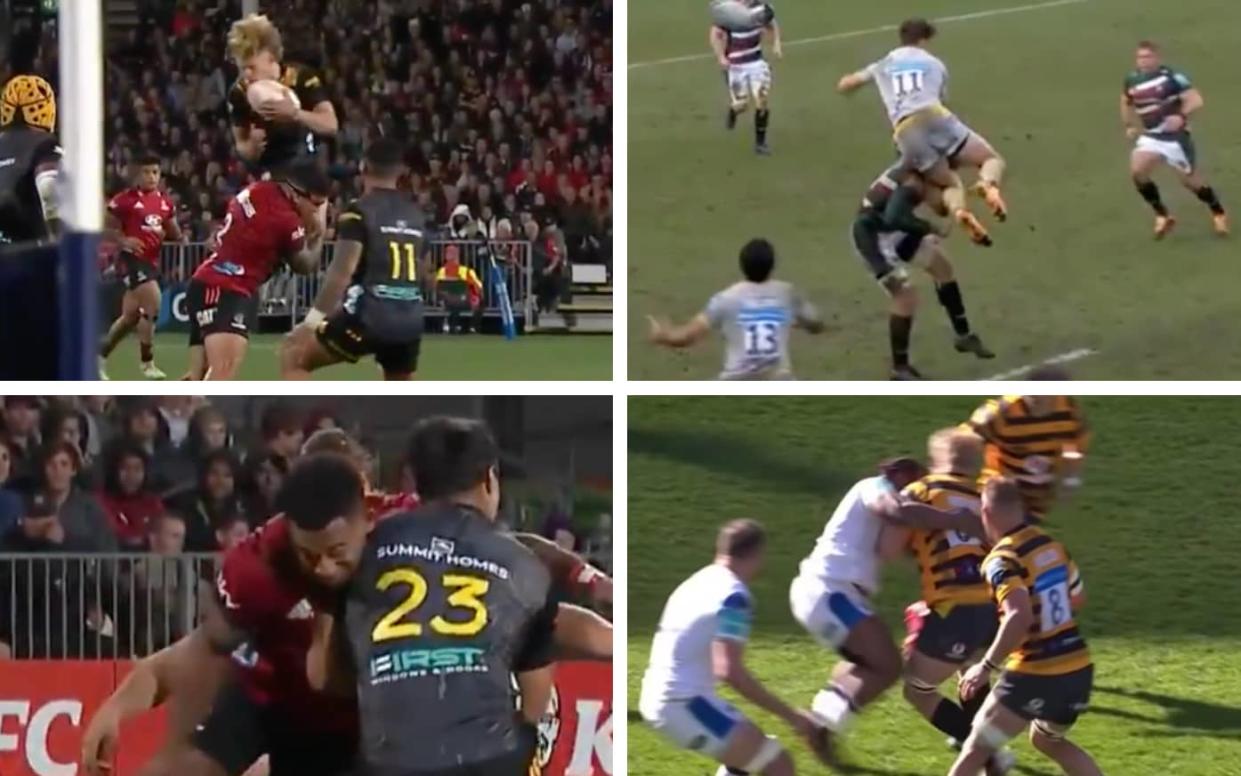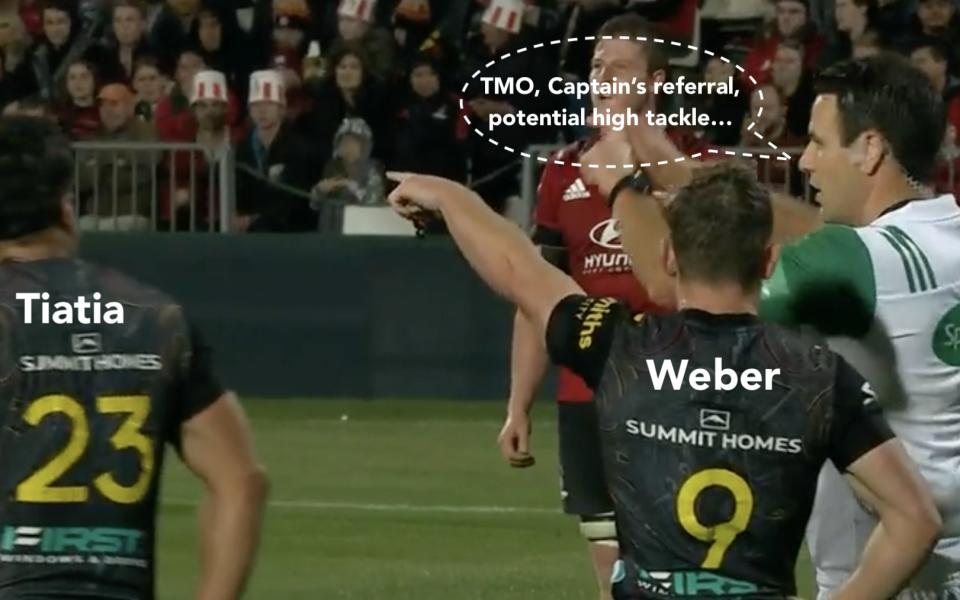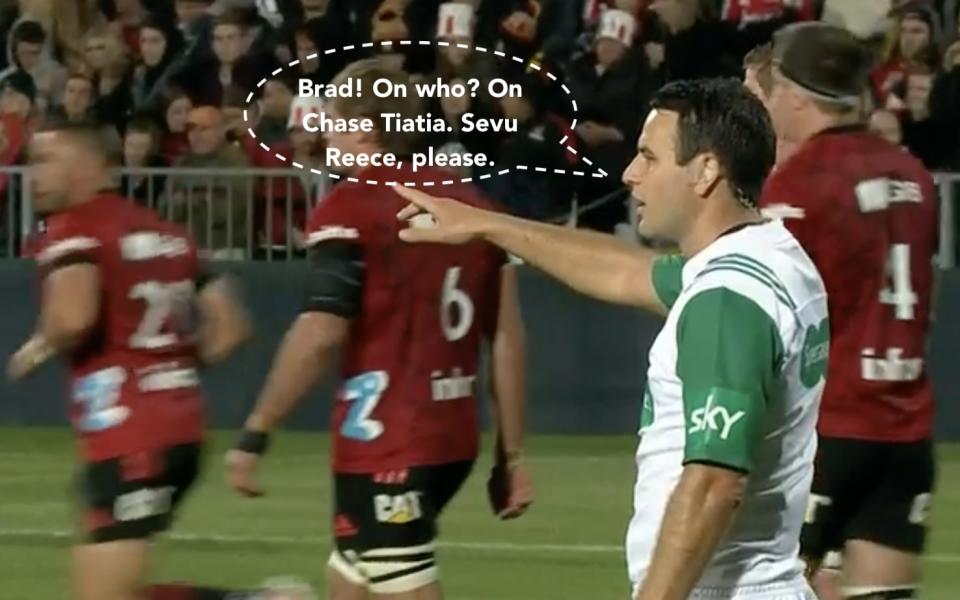Inside Line: Lack of red cards in Super Rugby Aotearoa final raises eyebrows

There was a lot to enjoy about Saturday's Super Rugby Aotearoa final, from Damian McKenzie's flowing mullet to Richie Mo'unga's commanding display at fly-half as the Crusaders made it five Super Rugby titles in a row.
But two pivotal decisions by referee Ben O'Keeffe dominated an entertaining second half. All Blacks Codie Taylor and Sevu Reece were both shown yellow cards to the surprise of northern hemisphere viewers, after similar incidents in the Premiership had led to stronger punishments.
With that in mind, here's a closer looker at how Taylor and Reece avoided further punishment and what's happened with similar incidents in the north.
53rd minute - Codie Taylor's yellow card for taking out Damian McKenzie in the air
It's worth going through the dialogue between O'Keeffe and his touch judges. The TMO, Brendon Pickerill, can't actually be heard on the broadcast at this point. Here's what you can pick up from the ref mic.
BO: Checking potential foul play, we have a penalty only at this stage for what looked like a tackle in the air.
BO: It's fair to say he's got time to pull out...
BO: So he's come from distance, sees him jumping...
Assistant referee: He has time to pull out...
'Penalty only' as the initial assessment is a bit of a surprise, but fair enough playing things cautiously. Presumably during this break in play, Pickerill is referring O'Keeffe to the latest rules on tackles in the air. World Rugby sought to clarify the rule back in the summer of 2018, issuing the following guidelines:
If a player is not in a realistic position to gather the ball, there is contact and their opponent lands on their back or side – Yellow card
If a player is not in a realistic position to gather the ball, there is reckless or deliberate foul play and the player lands in a dangerous position – Red card
McKenzie lands on his side, just, but is Taylor reckless? You could certainly argue so. In the end Taylor only gets a yellow card.
But that doesn't mean that the whole thought process behind the regulation isn't a little ridiculous. As soon as Taylor makes that contact with an aerial McKenzie, he has absolutely no control over how the full-back is going to land. His eyes are nowhere near the ball.
McKenzie falls on his shoulder and you can see his head then whips towards the ground, seemingly avoiding any contact. But he could just as easily have landed directly on his head. Taylor's lucky that gravity works in his favour on this occasion.
Codie Taylor sent for a dangerous tackle 🟨
Start your free trial of the Stan Sport add-on now#CRUvCHI #SuperRugbyAotearoa pic.twitter.com/Cp5NLlsgxT— StanSportAU (@StanSportAU) May 8, 2021
Premiership equivalent - Hanro Liebenberg's red card for Leicester against Wasps
A different circumstance, off a restart as opposed to from a lineout, but a similar disciplinary issue, with Liebenberg getting his timing all wrong and taking out Josh Bassett in the air. What's interesting about this incident is that Bassett doesn't actually land on his head either - but only because he sticks out his arms in order to break his fall.
Here's how the conversation went between referee Craig Maxwell-Keys and TMO Claire Hodnett. The key passage in their discussion is highlighted in bold.
CMK: What are we looking at Claire?
CH: The Leicester Tigers player running in, with his shoulder, taking the Wasps player out in the air.
CMK: I don't see No 6 ever looking to contest the ball in the air.
CH: Six Leicester is never in a realistic position to take the ball. Eleven Wasps is in the air and [Liebenberg] makes contact with the shoulder.
CMK: Never looking to contest, flips him round. We're looking at either landing point here to consider sanctions, or do we just deem this such a dangerous act, that landing point is irrelevant.
CH: I think the danger is such that the landing point is irrelevant.
Maxwell-Keys then opts to revisit the landing position to check whether it's head or neck, with the TMO noting that Bassett puts his hands out to break his fall. Liebenberg is subsequently red carded.
The point, though, made by Maxwell-Keys in that discussion above is interesting, because while in the case of McKenzie the letter of the law has been followed, there's barely any difference between the actual impacts of Taylor and Liebenberg.
Neither has a hope of contesting for the ball. And neither McKenzie nor Bassett land directly on their head; McKenzie through good fortune, Bassett by preventing that himself. And yet one is a red card and the other isn't.
Speechless. 😳
Hanro Liebenberg picks up the third red of the game and our fifth of the weekend. 🟥#GallagherPrem pic.twitter.com/Ct3uhjzeJh— Rugby on BT Sport (@btsportrugby) February 20, 2021
58th minute - Captain's referral leads to Sevu Reece yellow card for high tackle on Chase Tiatia
For those who haven't seen a captain's referral in action yet, the Chiefs have been awarded a penalty for not releasing when Brad Weber, the Chiefs captain and scrum-half, notifies O'Keeffe that one of his players, Tiatia, has been dangerously tackled by Reece. Weber calls for the referral and that leads to O'Keeffe calling in the TMO, Pickerill.

O'Keeffe even has to verify with Weber who the foul play was against on the Chiefs side.

Both sides had been warned earlier in the final about high tackles, so it's a smart move by Weber to put the pressure on the officials for a similar incident they have missed. Plus, it gives the Chiefs an easier shot at the posts.
Here's the discussion between O'Keeffe, his assistants and Pickerill.
BO: Does he go shoulder first? We just need details of where that first contact is.
BP: Ben, the contact is to the head.
BO: Brendon I need some details from you, whether the contact is direct to the head, or whether it starts below the line of the shoulders and rides up?
BP: Yeah the contact is direct to the head, Ben.
When the TMO adds that last line, the on-field officials almost look confused. Here's what Pickerill has seen from the TV angles.
As the officials prepare to watch the replay again, Pickerill adds: "I think yellow card here, Ben". It's worth noting here that direct contact to the head, which Pickerill has suggested, has frequently resulted in a red card in the Premiership this season.
O'Keeffe then says to his assistants: "If it's direct, we'll go yellow. If it's not, just a penalty." Pickerill confirms the contact is direct to the head, which O'Keeffe takes on board before explaining the final decision.
BO: We've got direct to the head contact, it's a high tackle. For me the danger's not extreme because he's flat-footed when he makes a tackle. I've just got a yellow card.
When explaining the decision to Reece, O'Keeffe adds that, "it's not severe force, so nothing further". He drops the punishment from a red to a yellow card, even though the contact to the head is direct, which follows the latest Head Contact Process released by World Rugby in March. You can watch Wayne Barnes explain how that system works here.
The Crusaders go down to 13 men after Sevu Reece gets sent 🟨#CRUvCHI #SuperRugbyAotearoa pic.twitter.com/Kra6V2dv8N
— StanSportAU (@StanSportAU) May 8, 2021
Premiership equivalent... take your pick
There have been 18 red cards in the Gallagher Premiership this season, compared to just one in the whole of Super Rugby Aotearoa, and you don't have to look far for examples of dangerous tackles which have met the red card threshold through a combination of force and contact to the head.
Take Kobus van Wyk for Leicester against Exeter...
Or Bath's Beno Obano against Wasps...
Or Mike Williams of Bath on Gloucester's Kyle Moyle...
Or Gloucester's Matt Banahan against Harlequins...
Or Ollie Thorley of Gloucester on Wasps' Rob Miller...
Or London Irish's Motu Matu'u on Ian Whitten of Exeter...
Some are those incidents are head-on-head contact, but that still falls under the direct contact to the head banner. Some are delivered with more force than others. And some took place after the last Head Contact Process was announced, and some didn't.
But when watching all of them and then examining the Reece incident, even keeping the Head Contact Process in mind, it wouldn't come as a shock if Reece had been shown a red card in a Premiership fixture for a similar tackle given the way these tackles have been officiated. O'Keeffe deemed the amount of force used by Reece to not be "severe", but it's certainly substantial and to the head.
That in its own way points to a bigger question about global consistency of refereeing, and we'll get a first taste of that when France head to Australia, the All Blacks host Italy (the poor Azzurri) and the British and Irish Lions tour South Africa this summer. It will be genuinely interesting to see how consistently key decisions are officiated.
Chiefs head coach Clayton McMillan at least tried to see the funny side after his team's Super Rugby Aoteaora final defeat.
“The one with Codie Taylor looked nasty, but I almost thought Damo [McKenzie] should have taken one for the team there and landed on his head. It would have been a different story," McMillan laughed.

